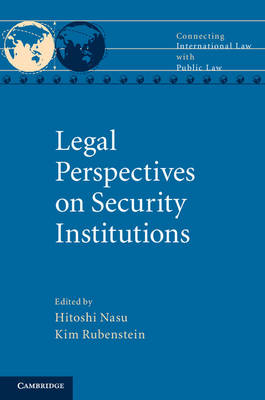
Legal Perspectives on Security Institutions
Cambridge University Press (Verlag)
978-1-107-10278-1 (ISBN)
Due to the continuing expansion of the notion of security, various national, regional and international institutions now find themselves addressing contemporary security issues. While institutions may evolve by adjusting themselves to new challenges, they can also fundamentally alter the intricate balance between security and current legal frameworks. This volume explores the tensions that occur when institutions address contemporary security threats, in both public and international law contexts. As part of the Connecting International with Public Law series, it provides important and valuable insights into the legal issues and perspectives which surround the institutional responses to contemporary security challenges. It is essential reading for scholars, practitioners and policy makers seeking to understand the legal significance of security institutions and the implications of their evolution on the rule of law and legitimacy.
Hitoshi Nasu is a Senior Lecturer at ANU College of Law, Australian National University, Canberra. His expertise lies in public international law, particularly international security law and international humanitarian law. Kim Rubenstein is Professor and Director of the Centre for International and Public Law at ANU College of Law, Australian National University, Canberra. Her work spans constitutional, administrative and citizenship law.
Introduction: the expanded conception of security and institutions Hitoshi Nasu and Kim Rubenstein; Part I. Security and Institutional Evolution: 1. Conscious and unconscious security responses Alexandra Walker; 2. 'You cannot hold two watermelons in one hand': gender justice and anti-state local security institutions in Pakistan and Afghanistan Bina D'Costa; 3. Institutional competence and the Common Foreign and Security Policy of the European Union Anne McNaughton; 4. Building international maritime security institutions: public and private initiatives Chie Kojima; Part II. Security Institutions and the Rule of Law: 5. General principles of law and a source-based approach to the regulation of international security institutions Imogen Saunders; 6. The United Nations Security Council's legislative phase and the rise of emergency international law-making Anna Hood; 7. Institutional evolution in Africa and the 'peacekeeping institution' Hitoshi Nasu; 8. Security and the law in international and domestic institutions: lessons from Israel's border security Solon Solomon; Part III. Security Institutions and Legitimacy: 9. The evolution of the nuclear non-proliferation regime: the International Atomic Energy Agency and its legitimacy Kalman A. Robertson; 10. The World Health Organization, global health security, and international law Adam Kamradt-Scott; 11. The institutionalisation of dispute settlements in Southeast Asia: the legitimacy of the Association of Southeast Asian Nations in de-securitising trade and territorial disputes See Seng Tan; Part IV. Security Institutions and Regime Collision: 12. The Food and Agricultural Organization and food security in the context of international intellectual property rights protection Dilan Thampapillai; 13. Rice is life: regional food security, trade rules and the ASEAN Plus Three Emergency Rice Reserve Michael Ewing-Chow, Melanie Vilarasau-Slade and Liu Gehuan; 14. Legal challenges to cyber security institutions Ottavio Quirico; 15. Concluding remarks Thomas Pogge.
| Reihe/Serie | Connecting International Law with Public Law |
|---|---|
| Zusatzinfo | 1 Line drawings, black and white |
| Verlagsort | Cambridge |
| Sprache | englisch |
| Maße | 157 x 234 mm |
| Gewicht | 770 g |
| Themenwelt | Recht / Steuern ► EU / Internationales Recht |
| Recht / Steuern ► Öffentliches Recht ► Völkerrecht | |
| Sozialwissenschaften ► Politik / Verwaltung ► Europäische / Internationale Politik | |
| ISBN-10 | 1-107-10278-2 / 1107102782 |
| ISBN-13 | 978-1-107-10278-1 / 9781107102781 |
| Zustand | Neuware |
| Informationen gemäß Produktsicherheitsverordnung (GPSR) | |
| Haben Sie eine Frage zum Produkt? |
aus dem Bereich


